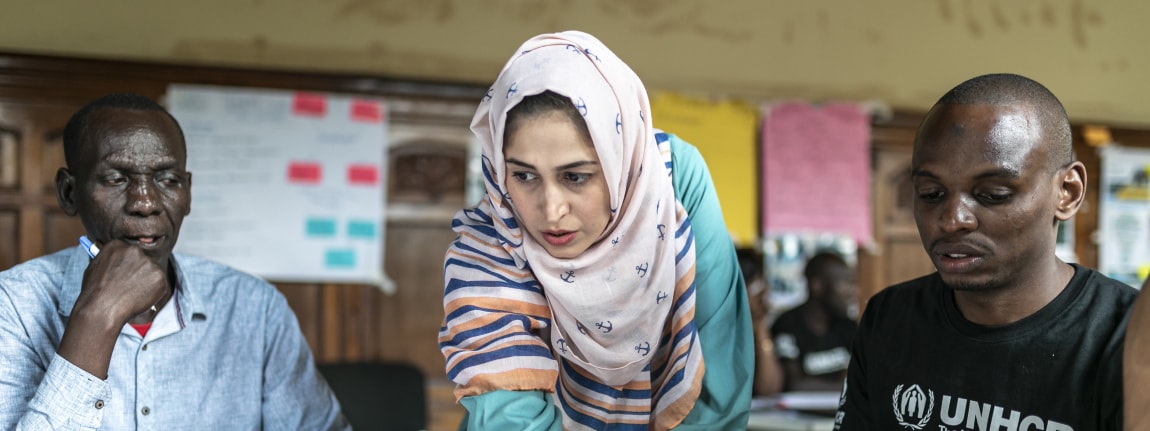BNP Paribas is committed to a more inclusive society and dedicates part of its action to integrating refugees in 10 European countries. How? What methods are used and what are the concrete results? Here is an update on the situation in 2021.
From 2015 to 2024: strong and renewed commitment by BNP Paribas to welcome refugees in Europe
A total of almost €17 million granted to this programme
In 2015, during massive flow of refugees into Europe, BNP Paribas decided to react immediately by launching a major action plan to support refugees in 10 countries. Two lines of support were initially created: emergency humanitarian aid with the UNHCR (UN High Commission for Refugees) in Greece, and integration of refugees in the 10 host countries by supporting professional integration and language learning programmes. Since then, BNP Paribas, aware of the major and persistent challenge of supporting refugees over the long term, renewed its support for organisations working in this field for three years in 2019.
Today, the bank is reaffirming its intention to continue this scheme from 2022 to 2024 with the same goal: enable refugees, both minors and adults, to learn the language of the host country in order to better integrate, find professional training, go back to school, receive support, receive coaching, gain autonomy and find a job.
Contributing to the achievement of this goal, the global sponsorship programme run by the BNP Paribas Foundation has made it possible to finance programmes for 25 organisations in the 10 European countries covered by the scheme (Germany, Austria, Belgium, Spain, France, Italy, Luxembourg, Poland, Switzerland, UK).
- One example is Joblinge in Germany, which, while giving German lessons, helps refugees to reflect on their professional careers, prepare their CVs and provides them with very concrete job-seeking support.
- In France, another example of support is the "Refugeeks" training provided by Simplon, a network of digital training in France, which in 8 intensive weeks, in small groups, develops two skills: mastery of French and fundamental digital tools.
Finally, as part of its partnership with the UNHCR, the BNP Paribas Foundation supports the “DAFI” programme(Opens in a new tab) of university scholarships enabling refugee students to access higher education, an effective means of facilitating their access to employment and better integration.
In 2020 in 10 European countries: 11,500 refugees benefited from the BNP Paribas programme, more than half of whom were minors.
In addition to sponsorship, BNP Paribas is committed to encouraging the recruitment of refugees through the Tent coalition
In 2020, BNP Paribas joined the international coalition Tent (Tent Partnership for Refugees), an international coalition of major companies committed to integrating refugees into the workplace. In France, ten companies from this coalition have created the “Refugees Are Talents” collective with Tent, along with Accor, Barilla, Sodexo, Ikea, Michelin, Ipsos, Keolis, L'Oréal and The Adecco Group.
This coalition is committed to stimulate recruitment, encourage other economic actors to join them, and promote arguments in favour of refugee employability.
In this context, BNP Paribas wishes to encourage volunteering and mentoring by its employees of refugees, while continuing to support managers in hiring them.
Finally, BNP Paribas, through the actions of French Retail Banking, also promotes employability by running dedicated incubators, such as those in the Paris suburbs of Montreuil and Saint-Denis, set up in partnership with Generali France and its foundation The Human Safety Net and La Ruche and which each year welcome a class of around thirty refugee entrepreneurs.
A more inclusive banking offer, able to adapt to this population
The issue of refugee integration raises another difficulty: access to banking and financial networks, a fundamental step towards employability and successful integration. Since 2020, Nickel enables 190 international passport holders to open a bank account, enabling them to receive government grants, as well as the possibility of obtaining a credit card.
The Group is also considering mobile solutions, which are very common in many countries with high emigration rates and thus more easily adopted by some refugees.
Support is complemented on the ground by assistance in the creation of microenterprises and microfinance schemes, such as MicroStart in Belgium and Microlux in Luxembourg.

